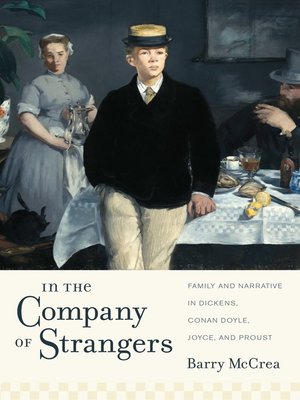In the Company of Strangers
ebook ∣ Family and Narrative in Dickens, Conan Doyle, Joyce, and Proust · Modernist Latitudes
By Barry McCrea

Sign up to save your library
With an OverDrive account, you can save your favorite libraries for at-a-glance information about availability. Find out more about OverDrive accounts.
Find this title in Libby, the library reading app by OverDrive.



Search for a digital library with this title
Title found at these libraries:
| Library Name | Distance |
|---|---|
| Loading... |
In the Company of Strangers shows how a change in the idea of family and its narrative role was central to the modernist reinvention of the novel. While plots of marriage and long-lost blood kin were the mainstay of the Victorian novel, Barry McCrea argues that queer countercurrents within these family plots set the stage for the radical narrative experiments of James Joyce and Marcel Proust.
Tracing a lineage from the sexually ambiguous criminal predators of classic nineteenth-century literature, such as Charles Dickens's Fagin or Honoré Balzac's Vautrin, through to Sir Arthur Conan Doyle's Sherlock Holmes and the adoptive "fathers" of the modernist novel, Joyce's Leopold Bloom and Proust's Charles Swann, McCrea demonstrates how bonds generated by chance encounters between strangers took over the role of organizing narrative time and novelistic relationships, a task that was once the preserve of the genealogical family. He reveals this new model of kinship to be fundamental to modernist structure and style. In the Company of Strangers subtly rewrites the history of the modern novel, suggesting that it is both queerer and more continuous than either the modernists or their critics would have us believe.







